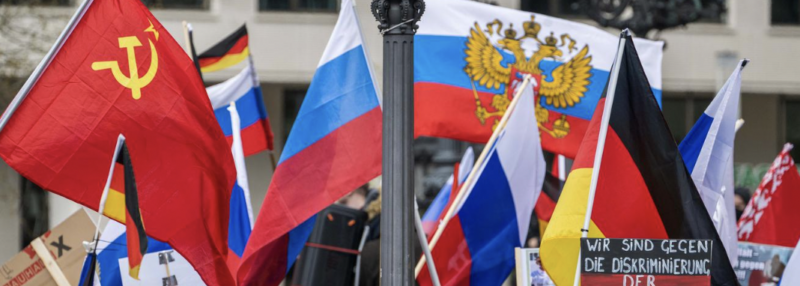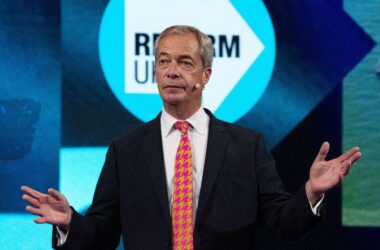Across Europe—but particularly in Germany—a disturbing trend is taking shape. The public is being conditioned, not informed. Narratives about Russia have moved beyond criticism into something closer to indoctrination. State broadcasters, major newspapers, politicians, academics, and even intelligence services have coalesced around a message that is simple, persistent, and ominous: Russia is not just the enemy—it is the enemy, and war is on the horizon.
What began as reflexive support for Ukraine in the wake of the 2022 invasion has evolved into something more deliberate. The machinery of media and politics in Germany is now openly preparing the public for the possibility—perhaps even the necessity—of direct confrontation with Russia. What we are witnessing is not a foreign policy debate. It is narrative warfare.
Propaganda in the Classical Mold
The methods used are familiar to anyone who has studied propaganda. The message is repetitive, emotionally charged, and intellectually shallow by design. The logic is circular: Russia is dangerous because it is evil, and it is evil because it is dangerous. Any nuance or complexity is treated as appeasement. Any dissent is portrayed as disloyalty or Kremlin influence.
The key themes are always the same: Russia alone is to blame for the war in Ukraine. Russia plans to invade Europe next. Russia cannot be reasoned with. These are not just ideas—they are incantations, repeated until they become unquestionable. Complexity is the enemy of propaganda. And so, the German public is offered simplicity, fear, and moral certainty in place of thoughtful analysis.
But this time, the propaganda is not just about defending Ukraine. It is about mentally preparing Germans for the possibility of fighting Russia themselves. The message is subtle, but relentless: Russia is a threat not just to Kyiv, but to Berlin. Not tomorrow, but today. And if war comes, it will be Russia’s fault—and ours to fight.
Absurdities as Instruments of Fear
Examples abound, but few are as revealing—or absurd—as the recent moral panic over a Russian pop song called Sigma Boy. A social media hit with typical internet aesthetics, the song was quickly labeled a Trojan horse for Russian patriarchy and authoritarianism. German and EU officials warned it was spreading “pro-Kremlin narratives” online, particularly among the youth. It was even described in official forums as a tool of Russian information warfare.
At face value, this is laughable. Sigma Boy is no more threatening than any other viral meme. But in the current environment, even trivial things can be repurposed into symbols of subversion. The panic says less about Russia and more about the psychological state of Europe’s ruling class: anxious, brittle, and desperate for control.
Even normally hawkish publications like Der Spiegel expressed discomfort with how overblown the reaction was. But the real problem is not that a pop song was misread. It’s that this kind of thinking has become normalized. A moment of comic overreach, yes—but part of a much larger pattern of treating everything Russian as suspect, subversive, or sinister.
The ZDF Scandal: Propaganda Without Restraint
But the stakes rise sharply when such thinking moves from music to terrorism. One of the most troubling recent examples came from Germany’s public broadcaster, ZDF. In a sensationalist documentary, ZDF claimed—based on highly dubious “research”—that Russia may have been behind a deadly Islamist terror attack in Mannheim. The implication was staggering: that Moscow was somehow orchestrating jihadist attacks in Europe by manipulating migrants.
This claim was built on a shaky reading of Google Trends data and vague online correlations—hardly solid ground for serious journalism. Yet it was broadcast with confidence to millions, further inflaming anti-Russian sentiment and feeding into fears of hybrid warfare.
Even Germany’s foreign intelligence service, the BND, objected. They pointed out that the data analysis was unreliable and that they had warned ZDF before the program aired. But the broadcast went forward anyway, bolstered by talking heads from security agencies and academia, all eager to feed the narrative.
When the backlash came, the broadcaster blamed a single data analyst. But that’s a deflection. Many voices—from officials to professors—participated in building and legitimizing the documentary’s broader message: that Russia is waging covert war on Germany itself. This is a serious allegation with profound implications, yet it was treated as media spectacle rather than responsible journalism.
The Broader Strategy: Constructing the Enemy
What links these episodes—the Sigma Boy scare, the ZDF scandal, and others—is the use of Russia as a catch-all villain. Whether it’s pop culture, cyber activity, social unrest, or terrorism, the answer is always Russia. And the solution is always more vigilance, more confrontation, and less debate.
This isn’t accidental. It is the function of a political culture that has decided Russia must be the eternal adversary, regardless of facts. Russia’s real geopolitical role, its interests, and its grievances are of no interest. It is to be demonized, not understood. Every event must be framed to serve this narrative.
Even acts of war or sabotage clearly linked to Ukraine or Western intelligence—like the Nord Stream pipeline sabotage, or the assassination of Russian public figures—are either ignored or reframed. The idea that Russia, a state with legitimate national interests and vast historical experience with foreign invasion and terrorism, might sometimes retaliate is never seriously entertained.
The asymmetry is staggering. Western nations can openly fund, train, and equip paramilitary operations in Ukraine. They can support hybrid tactics and sabotage under the banner of “resistance.” But the idea that Russia might engage in similar methods, even defensively, is treated as proof of its barbarism. This is not balance. It is hysteria masquerading as foreign policy.
Why It Matters
The consequences are serious. By normalizing anti-Russian paranoia, German media and political elites are not just distorting reality—they are making peace more difficult and war more likely. The public is being taught to fear and loathe Russia without understanding it. And without understanding, diplomacy becomes impossible.
Moreover, this campaign is hollowing out journalism itself. Media outlets have become megaphones for security services. Academics repeat talking points without disclosing conflicts of interest. Debate is replaced by moral posturing. And all of it prepares the ground for escalation.
This is not to excuse Russian actions, nor to deny the complexity of the Ukraine conflict. But serious politics begins with clarity and honesty—not scapegoating, distortion, and fear.
The real tragedy is that many Germans, like many Europeans, want peace. They remember their history. But they are being manipulated by institutions that are supposed to serve the public, not prepare it for another catastrophe.
If war comes, it will not be because ordinary people demanded it. It will be because they were told again and again that it was inevitable—and that questioning that message was disloyal.
Russia has many faults. But it is not responsible for the West’s intellectual laziness or moral cowardice. That blame lies much closer to home.




